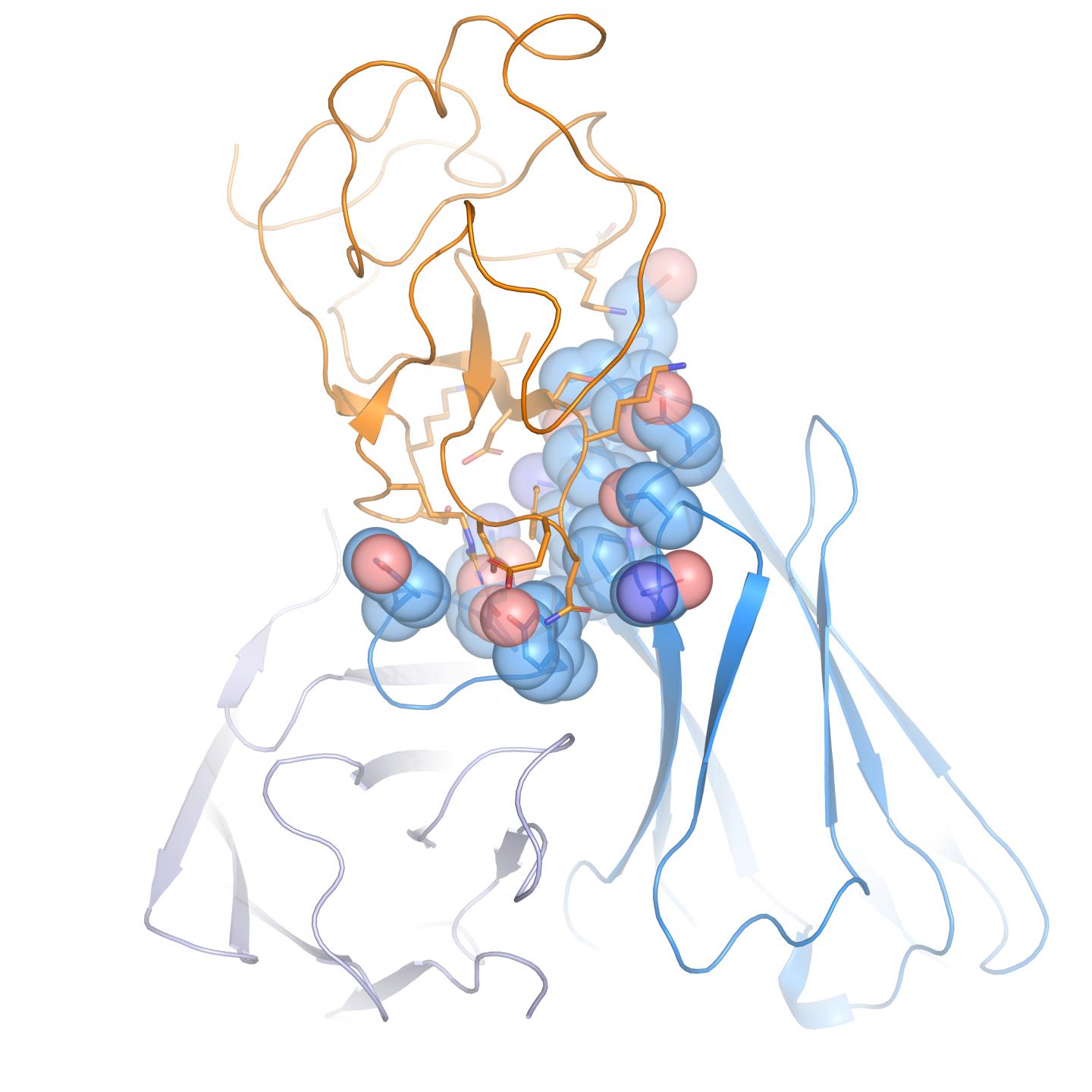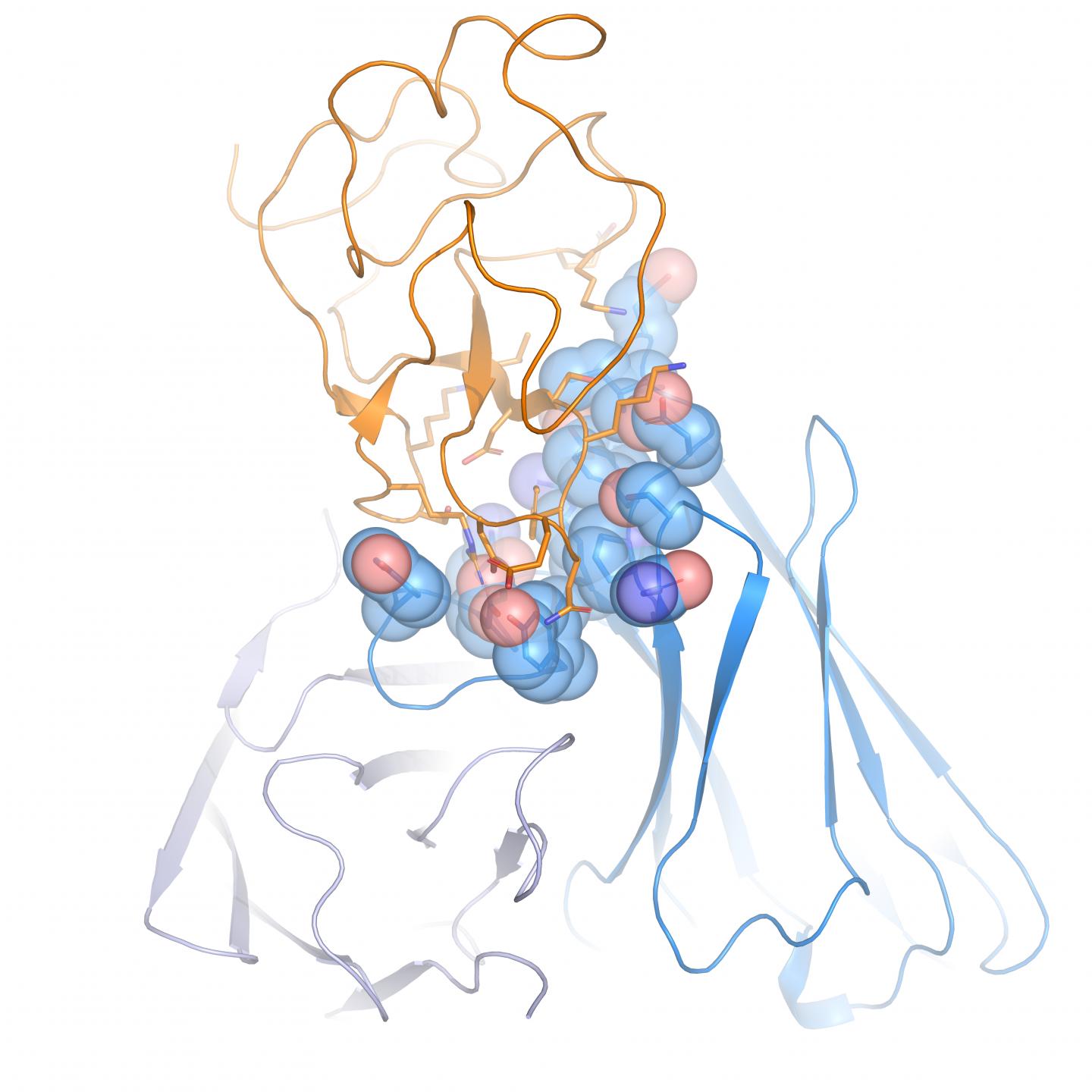
Credit: Rader lab, The Scripps Research Institute
JUPITER, FL–May 30, 2018–Our immune system's arsenal of defenses usually protects us from cancer. But sometimes, cancer cells overwhelm or evade this elaborate defense system.
In the lab of biochemist and immunologist Christoph Rader, PhD, associate professor at The Scripps Research Institute in Florida, scientists have engineered a new type of anti-cancer antibody, one intended to enhance nature's cancer-fighting strategies by attracting killer T cells directly to cancer cells covered with a distinctive protein.
Dubbed "T-cell engaging bi-specific antibodies," these cancer combatants attack malignant cells but leave healthy cells untouched. That's thanks to their selective targeting system, which zeroes in on a protein found on the surface of several types of cancer cells called ROR1, and also thanks to their talent for binding with T cells, the big guns of the immune system.
"Once the T cells are recruited and activated, they release cytotoxic molecules that penetrate the target cells and kill them," Rader says. "Natural antibodies can't do this. You have to engineer them in a bi-specific fashion to do this."
The scientists' work is described in the article, "Potent and Selective Antitumor Activity of a T-Cell Engaging Bispecific Antibody Targeting a Membrane-Proximal Epitope of ROR1," appearing online May 29 in the journal Proceedings of the National Academy of Sciences.
Rader is particularly interested in applying his bi-specific antibodies to a type of breast cancer with fewer treatment options, HER2-negative breast cancer.
"If you look at ROR1 expression in breast cancer, you see that the patients who are HER2 negative are often ROR1 positive," Rader says. "These breast cancer patients might benefit."
Antibodies are proteins made by white blood cells to attack specific targets like viruses, bacteria and cancers. A bi-specific antibody is a Y-shaped immune factor engineered to both bind with a specific disease target, and also to attract killer T cells, a type of white blood cell that destroys infected or dangerous cells.
ROR1 is an excellent target for a smart cancer-fighting system, Rader says, because it is seen only in mature cells that are malignant. Rader first discovered ROR1's activity in leukemia a decade ago while working at the National Cancer Institute.
"ROR1 is expressed during embryogenesis, and then it is tightly down-regulated after birth. It later reappears in both blood cancers and solid malignancies," Rader says.
It has been found on malignant cells including lung, breast, ovarian and blood-based cancers, Rader says.
"One of the most unique aspects of this bi-specific antibody is that it can work in so many different cancer indications," Rader says.
He credits first author Junpeng Qi, PhD, a postdoctoral associate at Scripps Research in Florida, with engineering a group of bi-specific antibodies that stay active in animal models for about five days–a feat compared with current approaches. The U.S. Food and Drug Administration has approved just one bi-specific antibody against cancer so far, against B-cell acute lymphoblastic leukemia. It stays active for a couple of hours, Rader says.
"Junpeng used a component of natural antibodies for this bi-specific antibody that gives it not only a larger size, but also the ability to be recycled and stay in the blood longer," Rader says. "They are not there eternally, though. You get rid of them eventually, which is important for avoiding systemic toxicity."
###
Other authors of the study, "Potent and Selective Antitumor Activity of a T-Cell Engaging Bispecific Antibody Targeting a Membrane-Proximal Epitope of ROR1," were Junpeng Qi, Xiuling Li, Haiyong Peng, and HaJeung Park of Scripps Research; and Erika M. Cook, Eman L. Dadashian and Adrian Wiestner of the Hematology Branch, National Heart, Lung, and Blood Institute, National Institutes of Health, Bethesda, MD.
The research was supported by NIH Grants R01 CA181258 and UL1 TR001114 and by donations from the PGA National Women's Cancer Awareness Days, Peter and Janice Brock, and the Anbinder Family Foundation.
About The Scripps Research Institute
The Scripps Research Institute (TSRI) is one of the world's largest independent, not-for-profit organizations focusing on research in the biomedical sciences. TSRI is internationally recognized for its contributions to science and health, including its role in laying the foundation for new treatments for cancer, rheumatoid arthritis, hemophilia, and other diseases. An institution that evolved from the Scripps Metabolic Clinic founded by philanthropist Ellen Browning Scripps in 1924, the institute now employs more than 2,500 people on its campuses in La Jolla, CA, and Jupiter, FL, where its renowned scientists–including two Nobel laureates and 18 members of the National Academies of Science, Engineering or Medicine–work toward their next discoveries. The institute's graduate program, which awards PhD degrees in biology and chemistry, ranks among the top ten of its kind in the nation. In October 2016, TSRI announced a strategic affiliation with the California Institute for Biomedical Research (Calibr), representing a renewed commitment to the discovery and development of new medicines to address unmet medical needs. For more information, see http://www.scripps.edu.
Media Contact
Stacey Singer DeLoye
[email protected]
561-228-2551
@scrippsresearch
http://www.scripps.edu
Original Source
https://www.scripps.edu/news/press/2018/20180530-cancer-antibody-florida.html http://dx.doi.org/10.1073/pnas.1719905115





